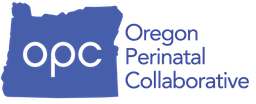Additional information and agenda details available on the 2023 OPC Annual Summit event page
Maternal Data Center (MDC) Lightning Rounds:
Data Quality Tools for Hospitals Outside of California
The MDC Lightning Rounds are 30-minute sessions dedicated to a single measure, tool or topic in the MDC. The October Lightning Round topic will cover the data quality tools available in the MDC for hospitals outside of California. Previous Lightning Round recordings and slide decks can be found in the MDC Support Section.
Tuesday, Oct. 10, 2023 | Noon-12:30 p.m. PT – Register Now!
September is Newborn Screening Awareness Month
In Oregon, every baby should receive two newborn screening blood tests, one at 24-48 hours after birth and a second at 1-2 weeks old. Newborn bloodspot screening is intended to identify infants who should receive addition medical follow-up. Oregon’s newborns are served by the Northwest Newborn Bloodspot Screening Program (NWNBS) run by the Oregon Health Authority (OHA) to manage and support screening of every infant born in the state.
Medical providers are essential to newborn bloodspot screening. Most parents agree to screening when properly counseled by a provider who explains the importance of detecting newborn bloodspot screening conditions early. If a parent or guardian is unable to pay the fee for the bloodspot test kit, they may apply for a fee waiver using the Fee Exemption Form.
HHS Maternal Child Health Emergency Planning Toolkit
In the most recent HRSA Maternal and Child Health Bureau (MCHB) newsletter, information was shared about the HHS Maternal Child Health Emergency Planning Toolkit:
“National Preparedness Month is an observance each September to raise awareness about the importance of preparing for disasters and emergencies that could happen at any time. HHS offers the Maternal-Child Health Emergency Planning Toolkit. This toolkit is designed to improve the capacity of health care, public health and social services professionals to address maternal and child health in emergency preparedness, response, recovery and mitigation activities. MCHB specifically funds children’s hospitals and their communities to be ready to care for children during disasters and public health emergencies through our Regional Pediatric Pandemic Network. We make sure that no matter where a child lives, the health systems in their area provide quality emergency care services.”
 |
| Our work is supported by cooperative agreement NU58DP006358, funded by the Centers for Disease Control and Prevention as well as funding from the Oregon Chapter of the March of Dimes. Additional in-kind donations have been made through Comagine Health, Oregon Health & Science University, and our generous volunteers. |




